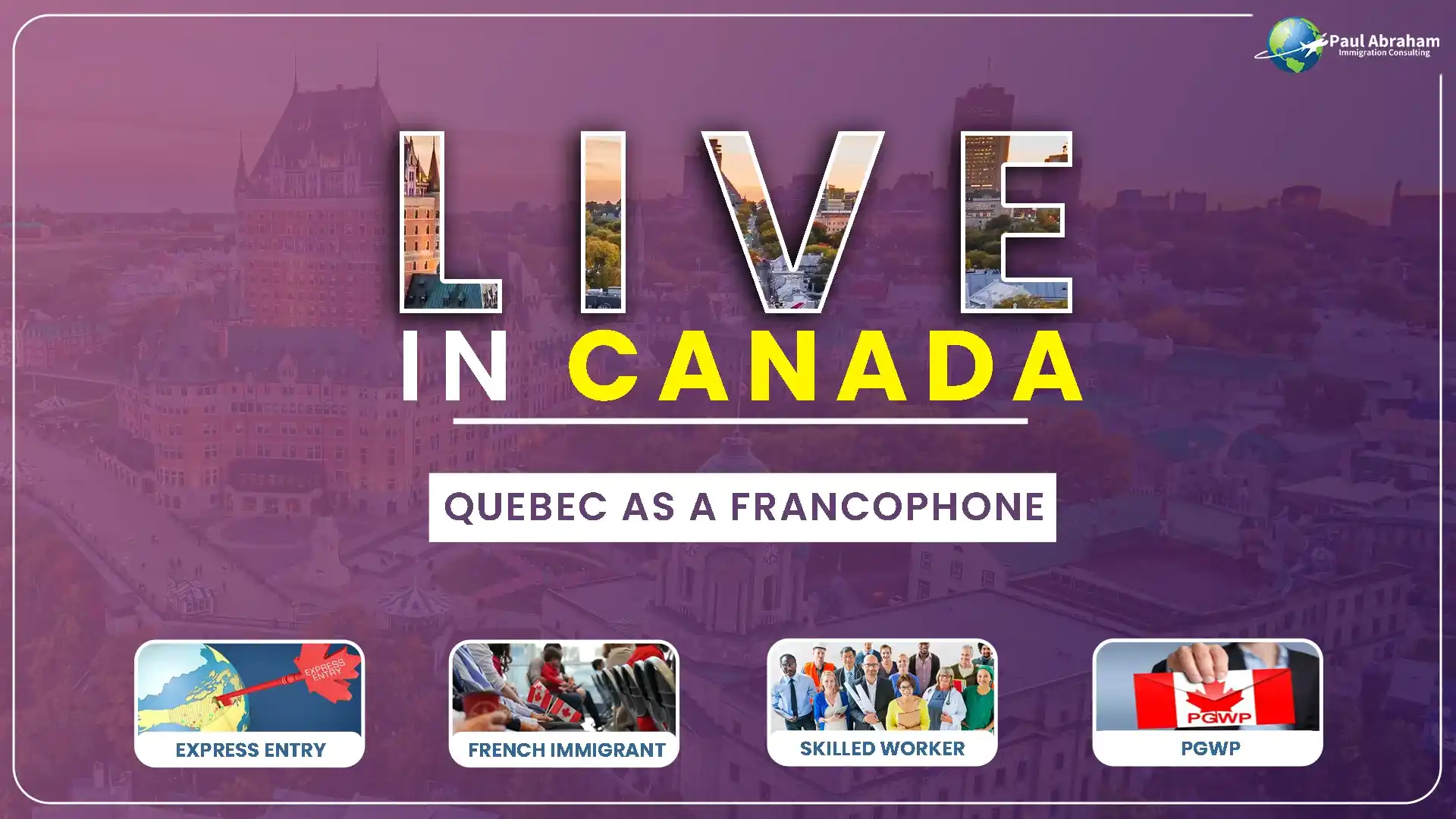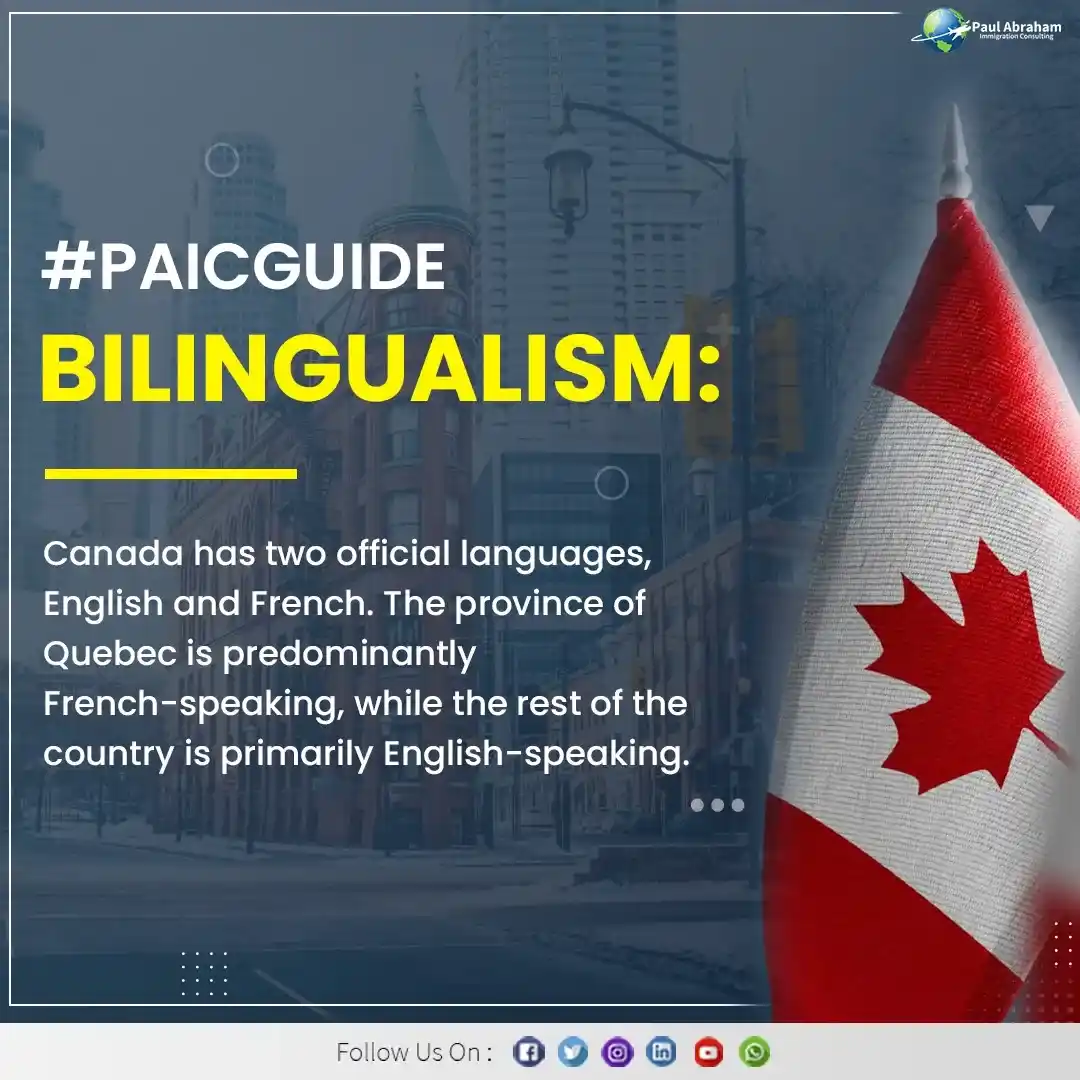Can I live in any Canadian province rather than Quebec as a Francophone?

Last Updated On : October 09 , 2023
With its rich history of promoting linguistic diversity, Canada welcomes Francophones worldwide. While Quebec is often the destination for French-speaking immigrants, Canada offers various pathways to settle in other provinces and territories.
This article will explore different immigration options for Francophones, the challenges they might encounter, and the Canadian government's support for Francophone communities.
What are the different ways to immigrate to Canada from France?
Canada offers several immigration programs for individuals from France who are looking to move to the country. One such program is the Express Entry for French-Speaking Communities. Another option is the French-Speaking Skilled Workers Stream, which specifically targets French-speaking individuals with work experience in certain occupations. Additionally, there is the Francophone Mobility Program, which aims to facilitate the immigration of French-speaking individuals who want to settle in provinces and territories outside of Quebec.
Express Entry for French-Speaking Communities
The Express Entry system, a popular immigration pathway, includes specific draws targeting French-speaking candidates. These draws grant additional Comprehensive Ranking System (CRS) points to candidates proficient in French. Referencing recent draws like Express Entry Draw #260 and Express Entry Draw #258 can provide insights into the latest CRS score trends.
Ontario’s Express Entry French-Speaking Skilled Workers Stream
Ontario offers the French-speaking skilled Workers stream as part of its Express Entry system. This stream is designed for French-speaking candidates who want to settle in the province. Meeting the eligibility criteria allows you to receive an invitation to apply for permanent residency in Ontario.
To be eligible for Ontario's Express Entry French-Speaking Skilled Workers stream, candidates must:
Meet Express Entry Requirements:
Candidates should already be in the federal Express Entry pool and meet the criteria set by the federal government's Express Entry program.
French Language Proficiency:
Proficiency in the French language is a key requirement. Candidates must demonstrate their language skills by taking a French language test recognized by the Canadian government, such as the Test d'évaluation de français (TEF) or the Test de connaissance du français (TCF).
Educational Qualifications:
Candidates must have a Canadian Bachelor's, Master's, or Ph.D. degree, or an Educational Credential Assessment (ECA) report showing that their foreign education is equivalent to a Canadian degree.
Work Experience:
A minimum of one year of full-time, or equivalent part-time, work experience in a skilled occupation (National Occupational Classification - NOC level 0, A, or B) within the past five years is required.
Intention to Reside in Ontario:
Candidates must have a genuine intention to reside in Ontario and should plan to settle in the province.
Proof of Funds:
Candidates must demonstrate sufficient funds to support themselves and their family members upon arrival in Ontario.
Francophone Mobility Program
The Francophone Mobility Program aims to attract French-speaking immigrants to provinces and territories other than Quebec. This program is a testament to Canada's commitment to prioritising Francophone immigration nationwide.
The Francophone Mobility Program is a testament to Canada's dedication to promoting linguistic diversity and fostering the growth of French-speaking communities outside Quebec. This innovative program is specifically designed to attract and facilitate the immigration of French-speaking individuals to provinces and territories across the country.
It recognises the invaluable contributions that Francophones bring to Canada's cultural and economic landscape, providing them with a streamlined pathway to permanent residency. By prioritising French-speaking immigrants, the Francophone Mobility Program helps ensure that Canada's linguistic mosaic continues to flourish within Quebec and in communities nationwide, reaffirming Canada's commitment to linguistic diversity and inclusivity.
Language requirement | French-Speaking Communities
The Express Entry system includes two primary language tests for French proficiency:
- Test d'évaluation de français (TEF)
- Test de connaissance du français (TCF)
These additional points can be a game-changer in the Express Entry competition, significantly improving a candidate's overall CRS score. In recent Express Entry draws targeting French-speaking candidates, the minimum CRS scores required for ITAs have been relatively lower than in other draws, making it an attractive pathway for Francophones.
This system benefits French-speaking candidates and aligns with Canada's broader goal of fostering linguistic diversity and supporting Francophone communities across the country. By prioritising French-speaking immigrants, Canada ensures that its French-speaking communities continue to thrive beyond the borders of Quebec.
What are the steps to get PR from study visa:
To obtain Canadian Permanent Residency (PR) from a study visa or a Temporary Residence (TR) permit, there are certain steps that need to be followed.
- Complete an Eligible Program of Study in Canada
- Gain Canadian Work Experience
- Assess Your Eligibility for Permanent Residence
- Apply for Permanent Residence
- Wait for an Invitation to Apply (ITA)
- Complete Medical and Security Checks
- Receive Confirmation of Permanent Residence (COPR)
- Arrive in Canada and Activate Your PR Status
Begin by enrolling in an eligible program of study at a recognized Canadian educational institution. Ensure you meet all program requirements and maintain good academic standing throughout your studies.
One of the crucial aspects of transitioning from a study visa to PR is gaining Canadian work experience. You can achieve this through programs like the Post-Graduation Work Permit (PGWP). The PGWP allows you to work in Canada for up to three years after completing your program, depending on the length of your program. During this time, you can gain valuable work experience, which can contribute significantly to your eligibility for PR.
Before applying for PR, assess your eligibility for the various immigration programs available in Canada. The most common pathway for international students is the Express Entry system. Calculate your Comprehensive Ranking System (CRS) score, considering factors like age, education, work experience, language proficiency, and Canadian work experience. You may also consider provincial nominee programs (PNPs) or family sponsorship if you have a qualifying connection in Canada.
Once you've determined your eligibility and gathered the required documents, you can submit your application for permanent residence. If you apply through the Express Entry system, you will create an online profile and enter the pool of candidates. If a province nominates you through a PNP, you will apply through their specific nomination program.
Candidates in the Express Entry pool will receive an ITA if they are selected in a draw based on their CRS score. Once you receive an ITA, you will have a limited time to submit your PR application.
As part of the PR application process, you will undergo medical and security checks to ensure you meet the health and safety requirements to become a permanent resident.
Upon approval, you will receive a Confirmation of Permanent Residence (COPR) and a permanent resident visa if required. This document allows you to enter Canada as a permanent resident.
Once you arrive in Canada, you must present your COPR to Canadian immigration officials. This step formally activates your permanent resident status in Canada.
Where do most French speakers live in Canada?
While Quebec remains Canada's French language and culture epicentre, French speakers can thrive in communities nationwide. Quebec, with its predominantly French-speaking population, is undeniably the heart of Francophone Canada.
Montreal, the largest city in Quebec, boasts a diverse and vibrant French-speaking population, making it a cultural hub. Additionally, regions in eastern and northern Quebec are predominantly Francophone.
Outside Quebec, New Brunswick stands out as Canada's only officially bilingual province. Acadians, descendants of French settlers, primarily inhabit this province. Cities like Moncton and Edmundston are notable for their strong French presence.
What challenges might you face as a French immigrant in Canada?
As a French immigrant in Canada, embarking on this new chapter comes with its challenges, particularly when initially entering the country as a temporary resident or an international student.
As a Temporary Resident
One notable challenge is the potential language barrier. While you may possess proficiency in French, Canada's linguistic diversity can be a hurdle, especially if you find yourself in an English-speaking region. Interactions with locals, job hunting, or even completing day-to-day tasks can become more complex when English proficiency is limited.
Additionally, securing meaningful employment as a temporary resident can pose difficulties, as Canadian employers often seek Canadian work experience or language proficiency that may not align with your qualifications or skills.
As an International Student
Language proficiency is a paramount challenge for those pursuing education in Canada. Many international students may initially need help following lectures and engaging in academic discussions conducted primarily in English or French. Language proficiency can significantly impact academic performance and social integration.
Cultural adjustment, which involves adapting to a new educational system and the broader cultural environment, can be overwhelming, leading to experiences of culture shock and homesickness that may affect overall well-being and academic performance. Additionally, financial strain is a common concern as tuition fees and living expenses for international students can be high.
Canadian Government Support for Francophone Communities
Moving to a new country could be a tough decision. However, when you are moving to Canada with your French-speaking skills, some additional services are provided by Immigration, Refugees and Citizenship Canada (IRCC).
Bilingualism Support
The Canadian government recognises the importance of bilingualism and provides services in English and French. This commitment extends to various government agencies, education systems, and federal institutions, fostering an environment where French speakers can access services and information in their preferred language.

Funding to Support Francophone Cultural Activities
Financial assistance is available to support Francophone cultural events and initiatives. These funds promote preserving and celebrating French culture and heritage in Canada. Francophone communities often organise festivals, artistic performances, and cultural activities that receive government support.
Cours de Langue Pour les Immigrants au Canada (CLIC)
The Cours de Langue Pour les Immigrants au Canada (CLIC) program offers language courses specifically tailored for newcomers to Canada. These courses include French-language classes, which can be invaluable for individuals looking to improve their language skills and integrate more effectively into Francophone communities.
These initiatives collectively reflect Canada's commitment to nurturing and preserving its rich French heritage and promoting the growth and integration of Francophone communities nationwide.
Conclusion
Canada provides numerous opportunities for Francophones from France to immigrate and succeed in various provinces. Whether pursuing permanent residency, seeking employment, or embracing vibrant Francophone communities, Canada is a welcoming destination. With bilingualism support and cultural funding, the government is dedicated to facilitating your journey. Start your Canadian adventure today.
FAQ
You can earn up to 25 additional CRS points with French-speaking proficiency.
French as a Second Language (FSL) is learning French when it's not your native language to communicate and integrate into Francophone communities.
The best pathway depends on your qualifications and goals. Common options include Express Entry, Provincial Nominee Programs (PNPs), family sponsorship, and studying in Canada.
Yes, you can apply for jobs in Canada from France. Many Canadian employers hire internationally, often conducting remote interviews.
In-demand jobs include healthcare, IT, skilled trades, education, and government positions, with bilingualism often an asset.
French proficiency requirements vary by job and location. Strong French skills are an asset; language requirements depend on specific job criteria and immigration programs.
